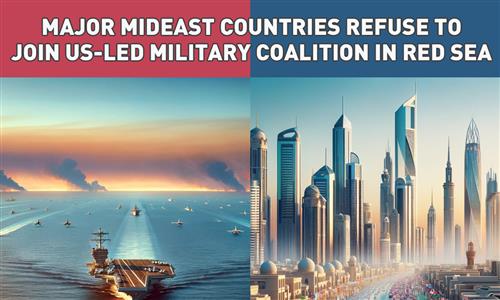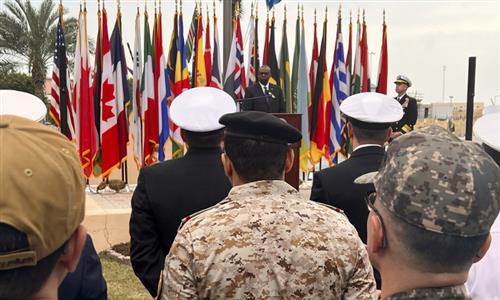The fundamental way to ensure peace and stability in the Red Sea is to achieve a permanent cease-fire in Gaza

US Secretary of Defense Lloyd Austin speaks at US Navy Central Command headquarters in Manama, Bahrain, on Tuesday. Photo: VCG
The Red Sea has become a new focus that is tugging at the world's heartstrings. Yemen's Houthis have announced attacks on all commercial ships directly linked to Israel, and the US has called on China to use its influence to pressure the Iran-backed Houthis. Is China capable of influencing the Houthis in this way? I am deeply skeptical. The Houthis have said they will only stop the attacks if Israel stops its military operations in Gaza. China cannot persuade Israel to stop, so what can it do to persuade the Houthis? However, China can do something to ask the Houthis to open their eyes before the problem is solved - they should not mistakenly attack the Chinese commercial ships.The Red Sea has emerged as a new turbulent area for the spillover of the Palestine-Israel conflict, and it is believed that the Houthis in Yemen possess a significant number of missiles and drones. While their capabilities may not be enough to engage in a conventional war, they are sufficient to target commercial ships. With the Houthis issuing threats and refusing to negotiate with the US, four shipping giants in Europe announced the suspension of Red Sea routes through the Suez Canal and the Red Sea, opting instead to redirect their ships to the Cape of Good Hope. This means a massive increase in transportation voyages and costs.
The US announced on Monday the formation of a multinational force to escort ships in the Red Sea, and immediately NATO countries such as Britain, Canada, France and the Netherlands announced their participation. But in the Middle East, only Bahrain has publicly announced its participation, and Egypt, Saudi Arabia and other countries have not.
The silence of Egypt, Saudi Arabia and other Middle Eastern countries reflects the deep differences between the Arab countries' attitude toward the Palestine-Israel conflict and that of the US. On one hand, by siding with Israel, the US stands in opposition to the majority of Arab countries. On the other, it requires Arab countries to accept its leadership in the Red Sea operation and provide warships and political resources. However, the primary goal of this is to protect the safety of shipping through Israel's ports, which will only embarrass the governments of those Arab countries in the face of their people and public opinion if they agree to follow the US. In addition, countries such as Egypt and Saudi Arabia are wary of Iran's attitude and do not want to affect their improving relations with Iran. The US claims that several other countries have also agreed to be involved in the operation but prefer not to be publicly named, presumably referring to the Arab countries.
The security of the Red Sea is indeed important, and it is reported that more than 20,000 ships pass through the Suez Canal and the Red Sea Passage each year. During my visit to the Suez Canal, I witnessed long lines of ships waiting to pass through. Chinese ports are commonly used as both departure and destination points for these ships, so China has a particular stake in the security of the Red Sea. China has an overseas support base in Djibouti on the western coast of the Gulf of Aden, which serves as the outlet of the Red Sea. There is a clear need for Chinese warships to step up escort operations in the Red Sea.
The Houthis have repeatedly reiterate the safety of maritime routes in the Red Sea and Arabian Sea, ensuring no threat to ships from any nation, except those linked to the enemy entity or destined for its ports. The Houthis should have a willingness to take their commitments seriously, because destroying this passage in the Red Sea will directly violate the interests of all coastal countries and make themselves a target of public criticism. The key lies in whether the Houthi armed forces can accurately focus on their target so that the majority of passing ships are truly safe.
The interests of many countries are involved, but the interests of most countries vary. In other words, everyone wants the Red Sea to be secure, but they are dissatisfied with the US using Red Sea security as a means to ensure Israel completes its operations in Gaza. They are also worried about whether the Houthis will disrupt the entire Red Sea.
If the frequency of attacks by the Houthi armed forces increases, the multinational patrols led by the US will not achieve its original goals. Once the situation worsens, some predict that the US and Israel may launch large-scale attacks against the Houthis' land bases, which will lead to the expansion of the war. Once that happens, the Red Sea channel will be ruined.
China undoubtedly welcomes peace and security in the Red Sea, but how we take on the role we play there will also be a complex issue. We must first protect the safety of Chinese ships and those directly related to China. On the issue of shaping regional peace mechanisms, we should coordinate our actions and adopt a consistent position with most Arab countries in the region. To ensure that Chinese ships are safe in the Red Sea, we should minimize the pressure on our ships to reroute around the Cape of Good Hope. Our moves and the joint patrol operations of the US will probably not get mixed up, but there is no need to create a conflicting relationship. After all, it is not a bad thing for everyone that the Red Sea is safe. In addition, we want to emphasize the concept that the fundamental way to ensure peace and stability in the Red Sea is to achieve a permanent cease-fire in Gaza and truly promote the political settlement of the Palestine-Israel issue.
The author is a Chinese media professional. opinion@globaltimes.com.cn



